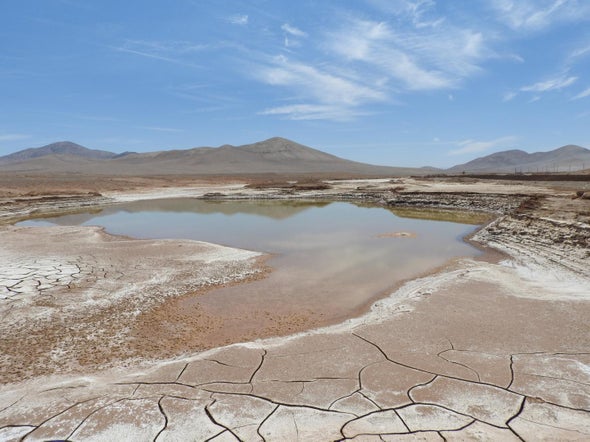(单词翻译:单击)
听力文本
This is Scientific American — 60-Second Science. I'm Christopher Intagliata.
The Atacama desert in Chile is one of the driest spots on Earth. Sometimes, you can't see any life at all. "As I was a kid those drives were very boring...because there was nothing to see." Armando Azua-Bustos was born and raised in Atacama. He's now an astrobiologist at the Spanish National Research Council's (CSIC) Center for Astrobiology. But he says, with closer inspection, life can be found. "There is life around, but you have to take a microscope in order to see microorganisms in those driest places in the Atacama."
Then in 2015, and again in 2017, freak storms from the Pacific flooded the Atacama. Ten times the usual amount of rain fell, turning some of the driest parts of the desert into lagoons. But the desert's hardy microbial life didn't exactly burst into bloom. "I start looking at the microscope and I couldn't see anything! That was surprising. I was expecting to see a zoo of little things moving all around. But I couldn't see anything."

In fact, after sampling three of the newly submerged areas, his team found only a quarter of the microscopic species they'd previously isolated in the desert region—perhaps, he says, because the water killed the rest, through a process called 'osmotic shock.' "The cell doesn't have the mechanisms to get all the water that is going into the cell to get it out, so they start inflating like a small balloon until they burst out." The results are in the journal Scientific Reports.
The microbial massacre should serve as a cautionary tale, he says, as we search for similar dry-adapted lifeforms on Mars. Because several of the life-detecting experiments performed by the Viking landers involved—you guessed it—adding water. And it would be tragic if we killed the first extraterrestrial life we found.
Thanks for listening for Scientific American — 60-Second Science. I'm Christopher Intagliata.
参考译文
这里是科学美国人——60秒科学。我是克里斯托弗·因塔利亚塔。
智利的阿塔卡马沙漠是地球上最干旱的地区之一。有时甚至根本看不到任何生命。“我小时候,觉得开车旅行很无聊,因为根本没什么可看的。”阿曼多·阿苏阿·巴斯托斯在阿塔卡马出生并长大。他现在是西班牙国家研究委员会(简称CSIC)天体生物学中心的天体生物学家。但他说,如果仔细观察,就能发现生命。“周围有生命存在,但必须用显微镜才能在阿塔卡马沙漠最干旱的地方看到微生物。”
2015年和2017年,阿塔卡马沙漠两次遭遇来自太平洋的反常风暴的侵袭。降雨量达到平时的10倍,这使沙漠中一些最干旱的地区变成了环礁湖。但沙漠中顽强的微生物却并没有蓬勃生长。“我开始用显微镜观察,可是我什么都没有看见!这太令人惊讶了。我原以为会看到各种微生物四处活动。可是我什么都没有看到。”
事实上,他的团队对三个刚被淹没的地区进行了取样,但所发现的微生物物种只有此前他们隔离在这一沙漠地区的四分之一——他说,这可能是因为雨水通过名为“渗透休克”的过程杀死了其余的物种。“细胞不具备将所有进入细胞的水分排出去的机制,因此它们会开始像小气球一样膨胀,直到最后爆裂。”这项研究结果发表在《科学报告》期刊上。
他表示,我们在火星上寻找能适应干旱的类似生命形式时,应该把微生物大屠杀作为警示故事。因为“北欧海盗号”火星探测器完成的多次探测生命实验均涉及——你猜对了——加水环节。如果我们杀死了我们发现的首个外星生命,那可就悲剧了。
谢谢大家收听科学美国人——60秒科学。我是克里斯托弗·因塔利亚塔。
译文为可可英语翻译,未经授权请勿转载!
重点讲解
重点讲解:
1. burst into (花、叶等)突然绽放,突然长出;
The avenues lined with jacaranda trees burst into a carnival of purple.
大街的两旁种着蓝花楹,绽放的花朵汇成一片紫色的海洋。
2. all around 各处;
All around he could hear people calling out his name.
他听见人们在四周喊着他的名字。
3. in fact 事实上,其实;
In fact, the oil companies are already prospecting not far from here.
事实上,石油公司已经在离此不远处进行勘探。
4. burst out 突然出现;突然发生;
Then war burst out.
战争突然爆发。


